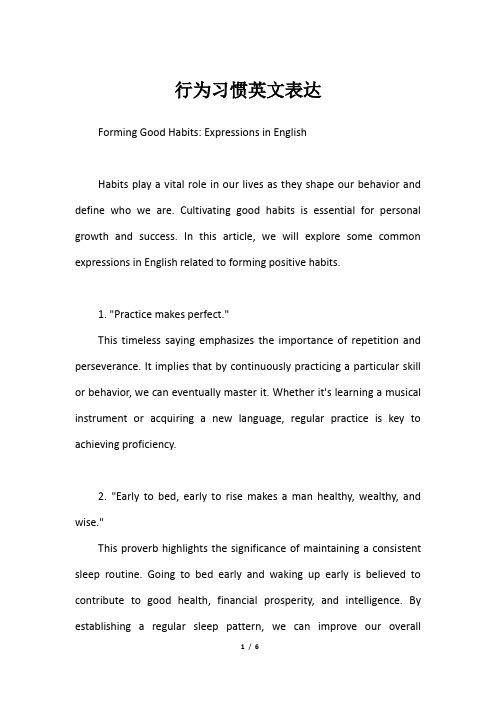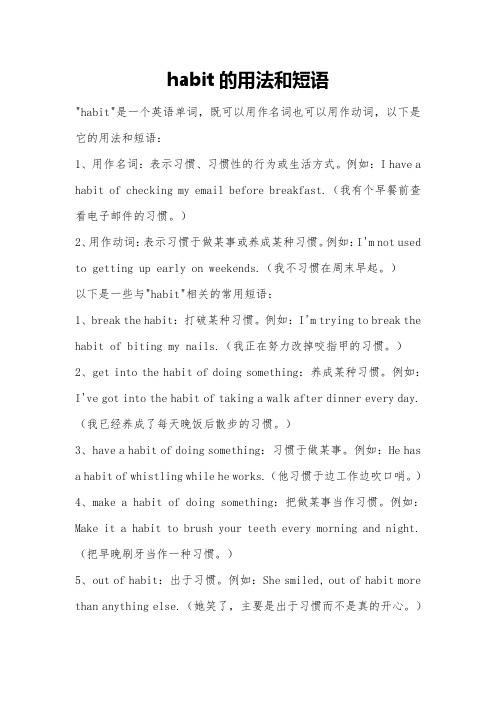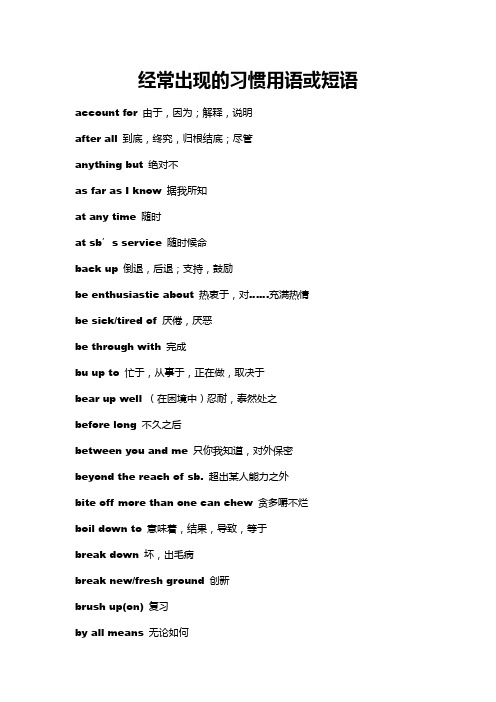必须明白的英语习惯说法
英语习惯用语

1..give me a hand foot the bill blow out lock, stock and barrel hook, line and sinker每一种语言都有它独特的成语和俗语。
而学习外语的人经常在理解这些习惯用语时会感到很困难。
这是因为你不可能从组成某个习惯用语的字面上来懂得它的意思。
比如,美国人经常说:“Give me a hand.” 按照字面来理解, “give me hand”就是“给我一只手。
”可是,它的意思却是“帮我一下忙。
”另外一个例子是: “Foot the bill.”“Foot”的意思是“一只脚”,而“bill”在这儿的解释是“账单”。
“Foot the bill.”并不是把帐单踩在脚底下,而是付账的意思。
另外,有的时候,一个词汇有好几种解释。
就拿下面一句话来作例子吧:例句-1:“We arrived two hours late at the big blow-out for Charlie’s birthday because our car had a blow-out.”这句话里第一个blow-out是指规模很大的聚会,第二个blow-out是指汽车的轮胎炸了。
整个句子的意思是:“由于我们车胎炸了,所以我们晚了两个小时才到达查理举行生日宴会的地方。
”还有一些习惯用语从字典上的意思来看是相同的,但是它们使用的场合却不同。
下面两个习惯用语就是很好的例子。
一个是“Lock, stock and barrel”,另外一个是:“Hook, line and sinker”。
Lock, stock and barrel和Hook, line and sinker都是全部的意思,可是用法却不同。
我们先来举一个Lock, stock and barrel的例子:例句-2:“Mr. Rockefeller bought the whole oil company lock, stock and barrel.”这句话的意思是:“洛克菲勒先生把整个石油公司买了下来”。
行为习惯英文表达

行为习惯英文表达Forming Good Habits: Expressions in EnglishHabits play a vital role in our lives as they shape our behavior and define who we are. Cultivating good habits is essential for personal growth and success. In this article, we will explore some common expressions in English related to forming positive habits.1. "Practice makes perfect."This timeless saying emphasizes the importance of repetition and perseverance. It implies that by continuously practicing a particular skill or behavior, we can eventually master it. Whether it's learning a musical instrument or acquiring a new language, regular practice is key to achieving proficiency.2. "Early to bed, early to rise makes a man healthy, wealthy, and wise."This proverb highlights the significance of maintaining a consistent sleep routine. Going to bed early and waking up early is believed to contribute to good health, financial prosperity, and intelligence. By establishing a regular sleep pattern, we can improve our overallwell-being and increase productivity.3. "Out of sight, out of mind."This phrase suggests that if something or someone is not visible, it is likely to be forgotten or overlooked. To apply this to habit formation, it implies that eliminating distractions or temptations from our surroundings can help us break bad habits or avoid undesirable behaviors.4. "Actions speak louder than words."This expression emphasizes the importance of taking action rather than merely making promises or talking about our intentions. It reminds us that our behavior and actions are more impactful and influential than mere words. To cultivate good habits, we must translate our aspirations into action.5. "A journey of a thousand miles begins with a single step."This quote highlights the significance of taking small, consistent steps towards a goal. It encourages us to start somewhere, no matter how insignificant it may seem, as every small action contributes to the overall progress. Breaking down larger goals into smaller, manageable tasks can make habit formation more achievable.6. "Old habits die hard."This saying acknowledges the difficulty of breaking long-established habits. It implies that ingrained behaviors are often challenging to change. To overcome this, it is essential to approach habit formation with patience, persistence, and a strong determination to succeed.7. "You are what you repeatedly do."This phrase emphasizes the influence of our habits on our identity and character. It suggests that our actions, performed consistently over time, shape our persona and define who we are. By consciously choosing positive habits, we can shape ourselves into the person we aspire to be.In conclusion, forming good habits is crucial for personal growth and success. These expressions in English remind us of the principles behind habit formation and provide valuable insights into the journey of self-improvement. By applying these concepts and adopting a positive mindset, we can cultivate habits that lead us towards a more fulfilling and prosperous life.英文中常见的行为习惯表达方式人类的行为习惯在不同的文化中有着不同的表达方式。
关于习惯的英语谚语有哪些

关于习惯的英语谚语有哪些关于习惯的英语有不少,同学们在平时的学习中都有阅读过哪些呢?今日小编就为大家整理了有关于习惯的英语谚语,供大家参考查阅,希望可以帮助到大家。
关于习惯的英语谚语1、习惯的力量是巨大的。
The force of habit is huge.2、习惯能造就第二天性。
Is used to produce a second nature.3、习惯使我们顺从一切。
Habit that we should obey everything.4、好的习惯比法律还正确。
Good habits than legal right.5、良好的习惯,如同一束鲜花。
Good habits, like a bunch of flowers.6、所谓生活,就是习惯的织物。
The so-called life, the fabric that is habit.7、来自于从小养成的习惯。
Success comes from habit formed in the childhood.8、习惯形成性格,性格决定命运。
Habit forming character, character determines destiny.9、坏习惯是在不知不觉中形成的。
Bad habits are formed unconsciously.10、人支配习惯,而不是习惯支配人。
People dominate habit, rather than a habit.11、美德大都包含在良好的习惯之内。
Virtues are mostly contained in good habits.12、成功的人很早就养成成功的习惯。
Successful people form the habit of success very early.13、习惯是智者的祸患、蠢货的偶像。
Habit is a wise man's ruin, and the idol of fools.14、法律是社会的习惯和思想的结晶。
关于好习惯的英语谚语

关于好习惯的英语谚语养成好习惯难,戒掉坏习惯更难。
a good habit, it is harder to kick a bad habit.好习惯成就一生,坏习惯毁人前程。
good habit a lifetime achievement, bad habit destroyed a future.好习惯使你进步,坏习惯使你颓废!good habit make you progress and bad habits make you decadent!幼时养成的良好习惯使人受益终身。
at a young age to develop good habits benefit the people for life.好习惯的养成就是为坏习惯所服务的。
good habits of services is a bad habit.原来沉默地跟在背后,不是一种好习惯。
originally in silence behind, is not a good habit.节约是好习惯,但很多时候却害人不浅。
it is a good habit to save, but most of the time is unfriendly.好习惯是管出来的;坏习惯是惯出来的。
good habits are out; bad habits are used.沉默的跟在背后,实在不是什么好习惯。
silence followed behind, it is not a good habit.摒弃坏习惯,培养好习惯。
abandon bad habits, develop good habits.再坚持几天,把好习惯留住。
hold on for a few days, keep a good habit.让优秀成为一种习惯,好习惯铸就好人生。
let the good become a habit, develop good life good habits.改得掉的都是好习惯,改不来的都是上瘾了。
habit的用法和短语

habit的用法和短语"habit"是一个英语单词,既可以用作名词也可以用作动词,以下是它的用法和短语:1、用作名词:表示习惯、习惯性的行为或生活方式。
例如:I have a habit of checking my email before breakfast.(我有个早餐前查看电子邮件的习惯。
)2、用作动词:表示习惯于做某事或养成某种习惯。
例如:I'm not used to getting up early on weekends.(我不习惯在周末早起。
)以下是一些与"habit"相关的常用短语:1、break the habit:打破某种习惯。
例如:I'm trying to break the habit of biting my nails.(我正在努力改掉咬指甲的习惯。
)2、get into the habit of doing something:养成某种习惯。
例如:I've got into the habit of taking a walk after dinner every day.(我已经养成了每天晚饭后散步的习惯。
)3、have a habit of doing something:习惯于做某事。
例如:He hasa habit of whistling while he works.(他习惯于边工作边吹口哨。
)4、make a habit of doing something:把做某事当作习惯。
例如:Make it a habit to brush your teeth every morning and night.(把早晚刷牙当作一种习惯。
)5、out of habit:出于习惯。
例如:She smiled, out of habit more than anything else.(她笑了,主要是出于习惯而不是真的开心。
habit的用法与常见搭配

habit的用法与常见搭配关键信息1、 Habit 的词性及基本释义名词:习惯;习性;惯常行为2、 Habit 的常见用法作主语作宾语作定语3、 Habit 的常见搭配Good/bad habit 好习惯/坏习惯Form/develop a habit 养成习惯Break/get rid of a habit 改掉习惯Be in the habit of 有……的习惯Fall into/get into the habit of 养成……的习惯11 Habit 的词性及基本释义Habit 是一个名词,其主要含义为“习惯;习性;惯常行为”。
例如:“Smoking is a bad habit”(吸烟是个坏习惯。
)“The animal has a habitof hiding food”(这种动物有藏食物的习性。
)111 Habit 作为“习惯”时的强调点当 habit 指“习惯”时,强调的是个人或群体经常、反复出现的行为模式,这种行为模式通常是在一段时间内逐渐形成并且相对稳定。
112 Habit 作为“习性”时的用法表示“习性”时,habit 常用来描述生物(包括人类)在自然环境中形成的、具有一定稳定性和遗传性的行为特征。
12 Habit 的常见用法121 作主语Habit 在句子中可以充当主语,例如:“Habit determines one's success to a large extent”(习惯在很大程度上决定一个人的成功。
)122 作宾语“Habit”也能作为宾语,比如:“You should change your bad habit”(你应该改掉你的坏习惯。
)123 作定语此外,habit 还可以作定语,修饰其他名词,像“habit formation”(习惯的形成)。
13 Habit 的常见搭配131 Good/bad habit 好习惯/坏习惯“Good habit”表示良好的习惯,如“Keeping a regular schedule is a good habit”(保持规律的作息是个好习惯。
英语中关于习惯的谚语

英语中关于习惯的谚语导读:1、疮怕有名,病怕无名。
Fear of fame, fear of namelessness.2、萝卜就开茶,饿掉大夫牙。
The radish makes tea and starves the doctor's teeth.3、饭后百步走,活到九十九。
Walk a hundred steps after dinner and live to ninety-nine.4、药难医假病,酒不解真愁。
Drugs are hard to cure, but wine is hard to understand.5、勤洗澡、常换衣,保证身上不招虱。
Bath regularly and change clothes regularly to ensure that you don't attract lice.6、朝食三片姜,如得人参汤。
Three pieces of ginger are eaten as ginseng soup.7、吃药不忌嘴,跑断太医腿。
Take medicine without fear of mouth, run off too much medical legs.8、生冷不入口,防病保长寿。
Cold does not enter, disease prevention and longevity.9、日发千言,不劳自伤。
Thousands of words are spoken every day.10、千补万补,不如食补。
It's better to make up for everything than to eat it.11、什么都缺别缺钱,什么都有别有病。
Everything is short of money, everything is different.12、一颗牙齿坏,满口牙受害。
One tooth is bad and the mouth is full of teeth.13、不吃苦,不赚钱,坐吃三年海也干。
英语经常出现的习惯用语或短语

经常出现的习惯用语或短语account for 由于,因为;解释,说明after all 到底,终究,归根结底;尽管anything but 绝对不as far as I know 据我所知at any time 随时at sb’s service 随时候命back up 倒退,后退;支持,鼓励be enthusiastic about 热衷于,对……充满热情be sick/tired of 厌倦,厌恶be through with 完成bu up to 忙于,从事于,正在做,取决于bear up well (在困境中)忍耐,泰然处之before long 不久之后between you and me 只你我知道,对外保密beyond the reach of sb. 超出某人能力之外bite off more than one can chew 贪多嚼不烂boil down to 意味着,结果,导致,等于break down 坏,出毛病break new/fresh ground 创新brush up(on) 复习by all means 无论如何by and by 不久,过一段时间call off 取消can’t help 禁不住,没办法car dealer 汽车销售商care for 喜欢,喜爱clear up 天气放晴,雨过天晴come along 进行,运行,进展,跟随,加入出现come around/come round 恢复,复原,改变看法,改变观点come down with 得病come into 得到,继承come up 提出cool off 使安静,冷静count in 包括在内count out 包括在外cut down on 减少某方面的数量、价格等day in and day out 日夜不停地,夜以继日地dig up(information) 搜集到,查到(资料等)do good 有效果,起作用do the laundry 洗衣服drop off 让…..下车easier said than done 说起来容易做起来难end up 达到某种状态,结果,到头来fall back on 依赖,依靠,求助于far from 毫不,远非,根本不是feel free to 觉得可以随意做某事few and far between 难得,少见,稀少figure out 找出,决定,解决,算出,理解,弄明白food for thought 引人深思的东西for nothing/for free 免费for sale 打算出售的,要卖出的from now on 从现在起from then on 从那时起from top to bottom 从上到下,彻底地,完全地,全面地get along 进行,进展,相处get at 意指,意思是get going 使开始,使运作get hold of 得到,找到(某人)get nowhere 毫无进展get on(someone’s)nerves 激怒,使生气get over 战胜,克服,完成,恢复,习惯于get there取得成功,实现目标get out of(doing sth.) 逃避,逃脱,免除(义务等)get rid of 摆脱,丢弃,扔掉give sb. a ride 让…..搭车give sb. a hand with sth. 帮助某人做某事go ahead 去吧!(干吧!走吧!)go around 足够,可满足需求,流行,流传,不辞辛劳去做某事go through a lot of money 乱花钱,花钱过度go through the proper channel 通过适当的渠道,经过适当的手续good bargain/good buy/good deal 真便宜,便宜的东西,合算的东西hand out 分发(材料等)have a way with words 长于言辞,会说话have a hand in 插手have a shore memory 健忘,记忆力差have one’s hands full with 忙于have things in one’s own way 以自己的方式行事head and shoulder above 胜过,超过help(oneself/sb.)to 为自己或某人取(事物,饮料等)help sb. with sth. 帮助某人做某事hold off 保持距离,回绝,推迟,拖延hold up 阻碍,延误,持久,耐用in ages 很长时间in good shape (指物)状态良好;(指人)in bad/poor shape (指人或物)处于不良状态或处境,健康不佳in no time 很快in the event that 在……情况下in the red 赤字,负债in the world (用来加重语气)到底,究竟in vain 无结果的,陡然inside out 把里面翻到外面,彻底in a mess 乱糟糟job offer 工作,工作机会或职位just any 随意地keep an eye on 留意,观察keep in shape (指人)锻炼身体,保持健康know a thing or two 略知一二,有所了解know something about 对……有所了解know better than to do sth. 明白事理而不去做某事lay off 解雇learn the ropes 摸到门道,学会窍门leave for 出发去(某地)leave sth. up to 由……决定leave well enough alone (谚语)不要画蛇添足let go 下课,解雇let off 让某人下车let out 放学light up 高兴起来,点烟,雨过天晴line up 安排,组织,使排列成行look for a needle 大海捞针look forward to 期盼,期望look up to尊敬lose weight变瘦make a reservation for 预定(机票、旅馆等)make ends meet 收支平衡make the most of/make the best of 充分利用make up 补考,化妆品,化妆,弥补make up(one’s) mind 下决心,做出决定meddle in 扰乱,打搅,瞎掺和meet each other half way 互相妥协now and then/again 偶尔,有时,不时地no way (表示强烈否定的语气词,表示拒绝或反对)不,不行not a bit/not at all/not in the least of 一点也不nothing but十分,非常nothing short of brilliant非常精彩off campus/on campus校外/校内on a diet节食on earth到底,究竟on one’s mind有心事,担忧,心烦on sale 降价出售on the right foot 以好的方式开始,开张大吉,开门红on the side 副业,业余兼职on the tip of(one’s) tongue 一时想不起了on the whole 总之,总的来说,总而言之on the wrong foot 以不好的方式开始,出师不利one in a million 极稀有的人或事,很难得或很少见once in a while 偶尔,有时,不时地out of business 停业,停产,关门,倒闭out of one’s mind 失去理智,疯了out of order 顺序杂乱,(机器等)坏了out of place 不合适,不和谐,不协调,不合群out of print 绝版out of the question 不可能,没有out of this world 非常好,绝妙的over one’s head 超出某人能力之外,难以理解pardon me (没听清别人话语时的用语)请原谅phone bill 电话费账单pull away (火车、汽车等)开走,离站pull in (火车、汽车等)进站put off 推迟,延迟put together 安装put up with 忍受,忍耐put someone up 为某人提供住宿raise the roof 非常吵闹,闹翻天,勃然大怒reach the bottom of the barrel 没有更多的东西,弹尽粮绝read sth. into sth. 将本来没有的意思加进去解释,自以为有某种含义result in 导致,结果ring a bell 让某人想起某事round the clock 日日夜夜run/have/get a temperature 发热run against sb. for (a position) 与(某人)竞选(某职位)run out of 用尽,用光run out of gas 疲倦,耗尽体力、精力或热情rush hour 交通高峰期save (one’s) breath 少费口舌,不必白费口舌see off 送行see to 照顾,注意set out for (a place) 出发去某处set up 做好准备,准备好shorthanded 人手短缺,人手不足show a lot of courage 表现得非常勇敢show enthusiasm on 对…..表现出热情show up 出现,到场,出席side by side 肩并肩地six of one and half a dozen of the other 半斤八两,两者无太大区别slip one’s mind/memory 忘掉stand up for 支持,拥护stay up 熬夜step up 增加,递增take it easy 不要紧,放松take (a course) over 重修(某门课)take (one’s) time 不慌不忙,拖拉,慢吞吞take over 接替,接管,接任take the plunge (经考虑后)决定冒险,采取大胆果断的措施take sth. seriously 认真对待talk to oneself 自言自语talk sb. into sth. 劝某人做某事talk sb. out of sth.劝某人不做某事tell apart 分辨,辨别,区别the other day 前几天,最近the sooner , the better 越快越好There is nothing to it. 非常简单。
- 1、下载文档前请自行甄别文档内容的完整性,平台不提供额外的编辑、内容补充、找答案等附加服务。
- 2、"仅部分预览"的文档,不可在线预览部分如存在完整性等问题,可反馈申请退款(可完整预览的文档不适用该条件!)。
- 3、如文档侵犯您的权益,请联系客服反馈,我们会尽快为您处理(人工客服工作时间:9:00-18:30)。
必须明白的英语习惯说法
1.dude(老兄,老哥)
容易误解为"花花公子, 纨绔子弟",实际上此词是叫男性年轻人常用的,与guy的意思相同,只是guy用的范围更广。
例子:Hey, dude, look at that girl. (喂,老兄,看那个女孩)
2.chick(女孩)
容易误解为"鸡,妓女",实际上此词是叫年轻女孩常用的,语气中确实有轻佻、不尊重的含义。
例子:Look at that chick at the door. (看门口的那个女孩)
3.pissed off(生气,不高兴)
千万别认为是"尿尿"的意思。
piss off在字典中则是"滚开, 滚蛋"
的意思,实际上此词是表示"生气,不高兴",与angry同意。
例子:Man, is that guy pissed off? (哎呀,哪家伙真的生气了。
)
4.Hey, Give me five(嗨,好啊!)
此短语非常流行,经常在大片中出现,是击掌庆贺时用的。
例子:Hey, dude! Give me five! (嗨,老兄,好啊!)
5.freak out(大发脾气)
总是在片子中看到这个词,freak是"奇异的, 反常的"的意思,但在这里是"大发脾气"的意思。
out也可以省略,这个词在美国很常用,老式说法是 be very upset。
例子:He's gonna freak. (他快要发脾气了。
)
6.Get out of here(别开玩笑了,别骗人了)
这个词大家都很熟悉,容易联想到"滚开"的意思,现在很多时候都是"别开玩笑了,别骗人了"的意思,在片子常可以听到,在美国非常流行。
例子:Man:You look very beautiful. (你很漂亮。
)
Girl: Get out of here. (别骗人了。
)
7.gross(真恶心)
这可不是"混乱"的意思。
字典中gross是"总的, 毛重的"的意思,实际上此词是表示"恶心",与gag 同意,是美国年轻人一天到晚挂在嘴边的词。
例子:Yuck, what is this stuff? It looks gross. (哎呀,这是什么东西?真恶心。
)
8.Hello(有没有搞错)
并不总是打招呼的意思,有时是"有没有搞错",要根据上下文来判断。
例子:Hello, we'll be late! ( 有没有搞错, 我们要迟到了。
)
9.green(新手,没有经验的人)
不是"绿色"的意思,也不是"生气"的意思。
green有时表示"新手,没有经验"。
例子:She's really green. She looks nervous. (她是新手,看起来很紧张)
10.Have a crush on someone(爱上某人)
由于crush是"压碎, 碾碎"的意思,因此整个短语容易被误解为"对某人施加压力"。
实际上此词表示"爱上某人",与fall in love with 同意。
例子:She thinks she has a crush on John. (她认为她爱上约翰了)。
